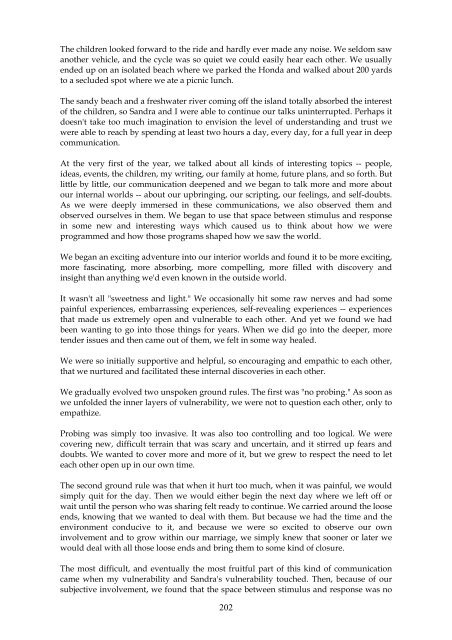Covey - The 7 habits of highly effective people
Create successful ePaper yourself
Turn your PDF publications into a flip-book with our unique Google optimized e-Paper software.
<strong>The</strong> children looked forward to the ride and hardly ever made any noise. We seldom saw<br />
another vehicle, and the cycle was so quiet we could easily hear each other. We usually<br />
ended up on an isolated beach where we parked the Honda and walked about 200 yards<br />
to a secluded spot where we ate a picnic lunch.<br />
<strong>The</strong> sandy beach and a freshwater river coming <strong>of</strong>f the island totally absorbed the interest<br />
<strong>of</strong> the children, so Sandra and I were able to continue our talks uninterrupted. Perhaps it<br />
doesn't take too much imagination to envision the level <strong>of</strong> understanding and trust we<br />
were able to reach by spending at least two hours a day, every day, for a full year in deep<br />
communication.<br />
At the very first <strong>of</strong> the year, we talked about all kinds <strong>of</strong> interesting topics -- <strong>people</strong>,<br />
ideas, events, the children, my writing, our family at home, future plans, and so forth. But<br />
little by little, our communication deepened and we began to talk more and more about<br />
our internal worlds -- about our upbringing, our scripting, our feelings, and self-doubts.<br />
As we were deeply immersed in these communications, we also observed them and<br />
observed ourselves in them. We began to use that space between stimulus and response<br />
in some new and interesting ways which caused us to think about how we were<br />
programmed and how those programs shaped how we saw the world.<br />
We began an exciting adventure into our interior worlds and found it to be more exciting,<br />
more fascinating, more absorbing, more compelling, more filled with discovery and<br />
insight than anything we'd even known in the outside world.<br />
It wasn't all "sweetness and light." We occasionally hit some raw nerves and had some<br />
painful experiences, embarrassing experiences, self-revealing experiences -- experiences<br />
that made us extremely open and vulnerable to each other. And yet we found we had<br />
been wanting to go into those things for years. When we did go into the deeper, more<br />
tender issues and then came out <strong>of</strong> them, we felt in some way healed.<br />
We were so initially supportive and helpful, so encouraging and empathic to each other,<br />
that we nurtured and facilitated these internal discoveries in each other.<br />
We gradually evolved two unspoken ground rules. <strong>The</strong> first was "no probing." As soon as<br />
we unfolded the inner layers <strong>of</strong> vulnerability, we were not to question each other, only to<br />
empathize.<br />
Probing was simply too invasive. It was also too controlling and too logical. We were<br />
covering new, difficult terrain that was scary and uncertain, and it stirred up fears and<br />
doubts. We wanted to cover more and more <strong>of</strong> it, but we grew to respect the need to let<br />
each other open up in our own time.<br />
<strong>The</strong> second ground rule was that when it hurt too much, when it was painful, we would<br />
simply quit for the day. <strong>The</strong>n we would either begin the next day where we left <strong>of</strong>f or<br />
wait until the person who was sharing felt ready to continue. We carried around the loose<br />
ends, knowing that we wanted to deal with them. But because we had the time and the<br />
environment conducive to it, and because we were so excited to observe our own<br />
involvement and to grow within our marriage, we simply knew that sooner or later we<br />
would deal with all those loose ends and bring them to some kind <strong>of</strong> closure.<br />
<strong>The</strong> most difficult, and eventually the most fruitful part <strong>of</strong> this kind <strong>of</strong> communication<br />
came when my vulnerability and Sandra's vulnerability touched. <strong>The</strong>n, because <strong>of</strong> our<br />
subjective involvement, we found that the space between stimulus and response was no<br />
202


